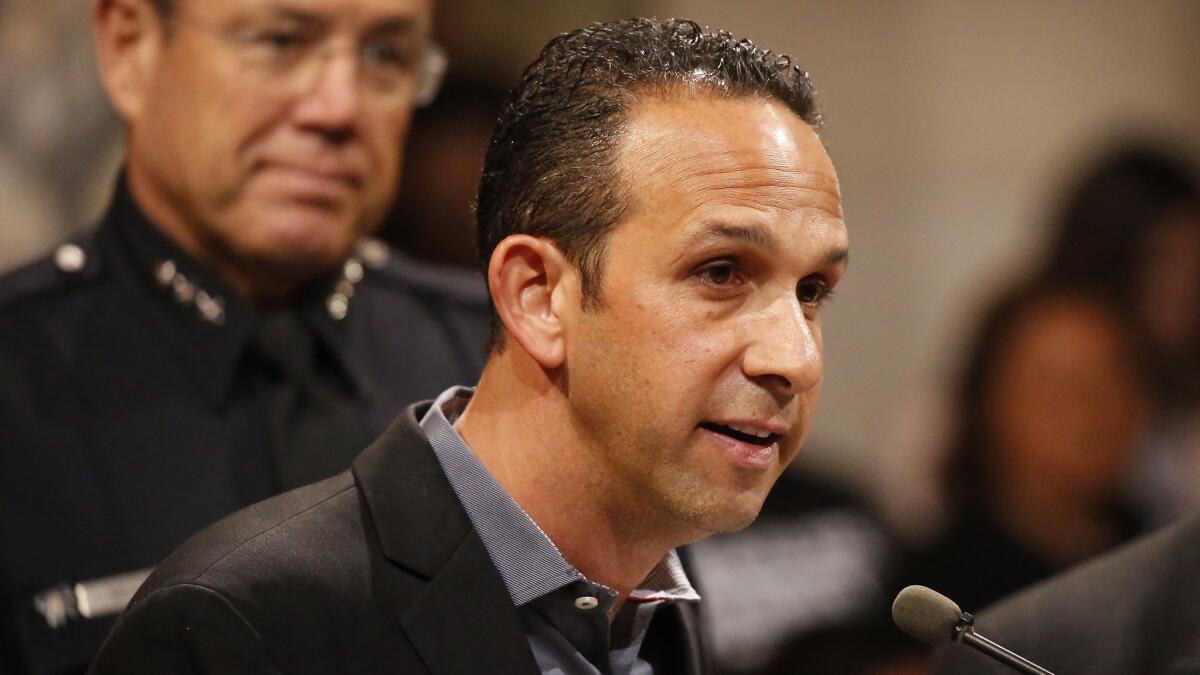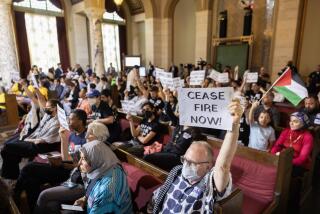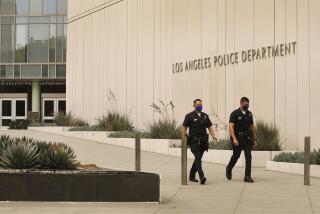Councilman Mitchell Englander quits blocking gun-rights group on Twitter after complaint

When a gun-rights group wanted to sound off about a new proposal from Los Angeles City Councilman Mitchell Englander, it went to Twitter to respond to him — only to find it had been blocked.
The Firearms Policy Coalition complained in a letter that the group, along with one of its members, could not reply to a tweet from the councilman about his proposed ban on downloading blueprints for 3-D printed guns.
It demanded that Englander stop blocking them, saying that its members “have a right to reply to your tweets and criticize your proposed legislation.”
And it pointed to a federal ruling that found it was unconstitutional for President Trump to block his online critics on Twitter. In that case, a judge rejected the argument that Trump was acting as a private individual through his @realDonaldTrump account.
Englander stopped blocking the group after it contacted him. His spokesman, Colin Sweeney, said it had been done in error sometime before the new proposal was introduced.
Blocking is nothing unusual in Twitter spats, but civil liberties groups argue that it raises 1st Amendment concerns when government agencies or elected officials hit the button. Government officials cannot discriminate against speakers based on their viewpoint, whether online or at City Hall, such groups charge.
If elected officials can block their critics from responding on Twitter, “you’re giving government officials the ability to manipulate the appearance of the public discussion,” said David Greene, civil liberties director for the Electronic Frontier Foundation. “People would look at that and say, ‘Everyone agrees!’”
Brandon Combs, president of the Firearms Policy Coalition, said it was important for the group to be able to engage directly with Englander on Twitter, calling it “a public square.” If the councilman had kept blocking the group, Combs said, “it would eliminate the opportunity for us to engage with him and others.”
Other Twitter users have also complained about being blocked by Englander on the online platform.
Torr Leonard, whose handle is @LakeBalboaCA, tweeted about being blocked by Englander nearly four years ago and said he was still blocked as of midday Monday.
Alexandra Nagy, an environmental activist who was involved in mobilizing residents after the Aliso Canyon methane leak, said she had been blocked by Englander for a few years.
And immigrant rights advocate Carlos Amador said he had been blocked for over a year, after criticizing Englander for opposing funding to provide legal aid to immigrants facing deportation. Amador said he still had plenty of ways to speak up about city issues but was upset to be blocked “for the mere fact that I raised a critical point.”
Sweeney said that in the aftermath of recent court rulings, Englander has blocked people only “in response to threats or hate speech.” The councilman has also stopped blocking Times reporter David Zahniser, who had been prevented at one point from replying to his tweets.
Sweeney did not immediately respond Monday to questions about how many and which accounts were still blocked by the councilman.
Englander isn’t the only L.A. council member to face questions about blocking critics: A few Twitter accounts started circulating the hashtag #blockedbycedillo last year, complaining that Councilman Gil Cedillo had cut them off on the platform.
Cedillo spokesman Fredy Ceja said no one is blocked from @gilcedillocd1, which is run by the council office and labeled as his “Official Twitter.” But Twitter user Jon Leibowitz said he was still blocked by the politician through another account. Ceja said that account, @gilcedillo, was “campaign related” and run by a different team.
Mayor Eric Garcetti is not blocking anyone from following his official @MayorofLA account, his spokeswoman Anna Bahr said Monday. However, some Twitter users have complained publicly about being blocked from another account, @ericgarcetti, which states that it is “not paid for, sponsored by, or hosted by city of L.A.”
Some L.A. council members told The Times they had blocked small numbers of people on Twitter for harassment, spam or “inappropriate material.” Greene said that government officials may use their Twitter accounts in different ways and whether blocking people poses a 1st Amendment problem can hinge on specific, case-by-case details.
“If they’re operating their account as a government official, then the 1st Amendment comes into play,” said Brendan Hamme, a staff attorney for the American Civil Liberties Union of Southern California. And if that is the case, Hamme said, “you can’t block simply because you disagree with the message.”
Twitter: @AlpertReyes
More to Read
Sign up for Essential California
The most important California stories and recommendations in your inbox every morning.
You may occasionally receive promotional content from the Los Angeles Times.










